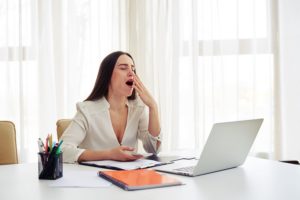
You wake up in the morning exhausted, so much so that one cup of coffee just doesn’t do the trick. You have another one when you get to work, but even that doesn’t seem to cut it. Even the third cup in the afternoon doesn’t quite seem to make you alert. You spend the entire day in a haze, more tired than you’ve been in a long time. When you finally get home and make it to bed, you want nothing more than to fall asleep. But sleep doesn’t come. At least not for a while. When it does, you wake up more exhausted than before. Does this sound familiar? Sleep apnea might be to blame for your tiredness and restless sleep, and caffeine is not the way to treat it. Read on to learn 3 ways that your diet might be affecting your sleep apnea.
What is Sleep Apnea?
Sleep apnea occurs when you stop breathing for ten or more seconds at a time while asleep. This usually happens when muscles and tissue in the throat relax and block the airway. Because you are asleep, you don’t know when these episodes are happening, so it can be hard to diagnose yourself, especially if you live alone. There are a few symptoms you can watch out for:
- Chronic morning headaches
- Waking up with exhaustion that lasts all day
- Waking up out of breath, with a dry mouth, or sore throat
- Memory loss and difficulty concentrating
- Mood swings
- Loud snoring
If you are male, overweight, over the age of 50, or have a large neck circumference, you have an increased risk of developing sleep apnea. If you think you might have the disease, contact your dentist or other healthcare professional.
Sleep apnea can be treated with a CPAP machine or an oral appliance that you wear to open the throat. However, there are a few ways you can use your diet to manage your condition:
Restricting Caffeine
Having an extra cup of joe or two throughout the day might make your exhaustion subside in the moment, but it can make it much worse in the long run. A cup in the morning can give you a much-needed boost, but having it too late in the day can give you trouble trying to fall asleep that night. Since caffeine can take 4-6 hours to leave the body, it’s best to avoid caffeine after lunch. That way, it will be all out of your system by bedtime, giving you a higher chance of getting to sleep quickly and easily.
Managing Obesity
The biggest and most preventable cause of obstructive sleep apnea is obesity. When you have more fatty tissue around your head and neck, your airway is more likely to collapse and get blocked during sleep. It never hurts to try and maintain a healthy weight, but it’s especially important for those who suffer from sleep apnea. Here are some things you can do to help:
- Exercise regularly.
- Control intake of sugar and carbs.
- Drink lots of water.
- Keep portion control in check.
Limit Alcohol Consumption
Many people enjoy a glass of wine or a few beers with friends in the evening, but it can actually lead to less restful sleep. Why is this? Alcohol acts as a sedative, rendering your nervous system less able to feel and react to stimuli. You might feel relaxed and fall asleep more quickly, but it can make your throat muscles relax as well. They are more likely to block the airway.
If you’re going to drink, do so at least an hour before bed, and drink with food if possible, as that will help inhibit the effect of the alcohol.
Sleep apnea can be a life-long condition, but there are a few things you can do to help manage it. Your dentist or doctor will likely have even more tips on dealing with it, so talk to them for advice!
About the Practice
At Rauchberg Dental Group, you can feel right at home with our kind and gentle staff. On our team, we have three general dentists, an endodontist, an orthodontist, and a periodontist, so no matter what your dental needs are in Parsippany, NJ, we can meet them! We also offer sleep apnea treatment to help you gain more restful sleep. To learn more, click here or call (973)-334-3777.
